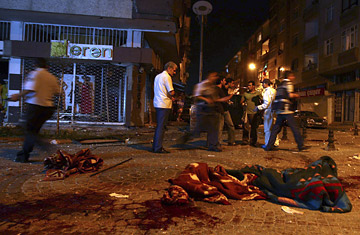
Police forensic experts examine the scene after an explosion in Istanbul on July 27
Temperatures in Turkey are rising, but it's not just a matter of the fierce July sun. A verdict in a landmark case to shut down the government for alleged Islamism is expected by next week, and a prosecutor recently alleged that a powerful cabal of nationalist hit men has plotted to bring the country's institutions to a fall. So when two fatal bombs ripped through a working-class Istanbul neighborhood on Sunday night, killing 17 and injuring another 150, the already palpable tension in Turkey went up another few notches.
"Turkey is at a historic turning point," says Cuneyt Ulsever, a columnist for the mainstream daily Hurriyet. "But there's no one controlling this change, which unnerves me. It's as if we're riding a bus and there's several people vying to take control of the steering wheel, but nobody knows which direction we'll end up taking."
The attack came just hours before a top court convened today to decide whether to ban the ruling Justice and Development Party (AKP) for threatening to undermine the separation of state and Islam in secular Turkey. "It sounds paranoid," says Ulsever, "but, like many people, I can't help thinking everything is connected."
No one has claimed responsibility for Sunday's explosions, which Istanbul's governor Muammer Guler called a terrorist attack. The two explosions were cruelly timed 10 minutes apart; many in the normally quiet residential area on the outskirts of the city became victims when they ran to the scene after hearing the first explosion. Guler suggested that the attack may have come from the Kurdish separatist group PKK, which has carried out scores of terrorist bombings in Turkey since 1984. But the group's actions rarely target civilians, and a news agency close to the PKK said it condemned Sunday night's bombings.
Apart from the longstanding Kurdish issue, Turkey has been increasingly edgy over the past few months, with the country's secularist establishment — mainly the military and the courts — locked in a struggle for power with the Islamic-rooted ruling party. On Monday, the 11 judges of the Constitutional Court began deliberating in the capital, Ankara, on whether to ban the AKP for anti-secularist activities. Separately, a court last week agreed to take up an indictment against 86 people — including military officers, journalists and senior businessmen — accused of high-profile political killings, extortion and violence designed to foment unrest and justify a military coup.
The Constitutional Court case has precedents; in 1998 and 2001, it banned the party's two predecessors on similar grounds. But this time is different. The AKP enjoys far more popular support than either of its forebears: having received 47% of the vote in elections last July, it has held on to its position as the country's first single-party government in decades. The AKP has also been careful not to offer up the radical political Islamic rhetoric that has put previous pro-religious parties in direct conflict with Turkey's secularist traditions and laws. What's more, it was under the AKP's leadership that Turkey finally began talks to join the European Union, and its economic program is aggressively liberal. (Though the same can't be said of the AKP's social policies.)
The current crisis was fueled by a single act of what the AKP's opponents consider to be political capriciousness. The government abandoned a much-needed overhaul of the country's constitution — a problematic document drafted by generals after the 1980 military coup — on which a broad coalition of academics and NGOs had been working. Instead, led by fiery Prime Minister Recep Tayyip Erdogan, MPs pushed through just a single constitutional amendment: one that would lift the ban on headscarves in universities.
In Turkey, the issue of allowing headscarves in public buildings packs discord much like the issue of abortion does in the U.S. For the devout, the existing ban amounts to a violation of their right to religious expression; for secularists, the headscarf has become a symbol of a political movement they fear threatens their lifestyle.
Top prosecutor Abdurrahman Sarikaya reacted to the headscarf amendment by filing an indictment asking the court to ban the AKP and 71 of its politicians, including Erdogan, for anti-secularism. Erdogan has since conceded he may have made mistakes. "We need to restore social peace again. What is important is to live together under this sky in unity," he said in a Hurriyet interview on Saturday.
The judges are expected to reach a decision by next week — a verdict requires 7 out of 11 votes. They are largely a staunchly secularist group, with an aversion to the politics of Erdogan and company. But the judges are also bound to weigh the evidence on legal grounds and decide whether the government's actions, regarding the headscarf and other matters, warrant such drastic action.
If banned, the AKP will likely regroup under a different name and call early elections, seeking an even larger win. Its banned politicians could even run as independents, under a strange legal loophole. Perhaps they will have learned a lesson in building democratic consensus. Meanwhile, those indicted in the alleged nationalist plot will go on trial in October, which could be key to strengthening the rule of law.
Good things may yet come of this exhausting upheaval, and Turkey does have a way of bouncing back from the brink. But in the midst of a global economic crunch, as conflict brews between neighboring Iran and the West, it has squandered valuable time and credibility on an essentially internecine dispute. Sunday's bombings are at the very least a fatal reminder of how high the stakes are.
